Best Wireless Microphone for Singing and Public Address 2023

Author & Contributors
Raphael Pulgar
I've been an audio engineer for 20 years specializing in rock and metal recordings. I also play guitar and produce original music for my band and other content creators.
Best Wireless Microphone System With 4 Mics
VocoPro UHF-5805 900MHz
- No indicator of range - might not be usable in large venues
- Great value for 4 mics
- Fast Charging
- Easy to use
The Vocapro UHF-5805 900MHz features a four-channel rackmount receiver and four wireless mics in a package that ensures easy and hassle-free operation.
The package includes 2 dual mic chargers for fast charging and an aluminum travel case.
It earns a high Gearank score thanks to its simplicity and ease of use. The charge time is also surprisingly fast.
One thing to note is the unit's range: there is no indicator of the unit's range on any promotional materials. This should be fine in small venues or if the receiver is just next to the stage, but there might be better options for larger venues.
Despite that con, if you need a no-nonsense 4-mic wireless set for small events, The VocoPro UHF-5805 900MHz is a good purchase.
Features
- Mic frequency response: 40Hz–16kHz
- Receiver frequency: UHF 900MHz
- Range: Not Specified
- Four XLR outputs and a 1/4’’ audio output jack
- 4 individual XLR mic outputs and 1-1/4" mixed output
- 2 dual microphone chargers
- Rugged 1RU metal receiver chassis
Best Wireless Microphone Systems With 2 Mics
Shure BLX288/PG58
- No mute/power button
- High Quality Shure build
- Long battery life
- Good sounding PG58 capsule
Shure has combined their budget dual BLX receiver with their budget PG58 microphone to produce a reasonably affordable 2-mic system.
The PG58 has a frequency response similar to the famed SM58, with a slightly different upper midrange and treble lift.
Multiple frequency band options are available for those who want to set up multiple units without conflict.
You are assured of build quality and ruggedness as a Shure cordless microphone. The BLX288/PG58 set's reliability means worry-free events and performances. Battery life is also above average, which makes it a good fit for longer performances.
While the PG58 mic capsule is a step down from the SM58 regarding sound and ruggedness, it's a marginal compromise for the system's value at this price point.
Another thing worth noting is the lack of a mute or power button on the mics. This would have been an excellent feature to give control to the performer concerning muting.
While this is the cheapest way to get two Shure wireless mics, it may still exceed the average mic users' budget. Still, investing in this system is highly recommended, especially considering its sound quality and longevity.
Features
- Mic frequency response: 60Hz to 15kHz
- Receiver frequency - can be bought in the following UHF bands:
- H10 Band (542 - 572 MHz)
- H11 Band (572 - 596 MHz)
- H9 Band (512 - 542 MHz)
- J11 Band (596-608 + 614-616 MHz)
- Range: Up to 300 feet
- Balanced XLR and non-balanced 1/4" output
- 12 channels.
Shure BLX288/SM58
- Transmitters are a bit flimsy
- Tried and tested Shure SM58 Mics
- Large coverage
- Great battery life
2-mic systems like the Shure BLX288 / SM58 are specifically designed for bands with just one or two singers.
It features two handheld microphones based on the iconic SM58 capsule.
Each transmitter runs on two AA batteries with up to 14 hours of use and a transmission radius of up to 300 feet.
This system includes a BLX88 dual-channel wireless receiver with an easy 1 button setup and can work with up to 12 compatible systems per frequency in case you want to add more wireless systems.
It's easy to say that everyone has used an SM58 at least once in their careers. The microphone is just that: a wireless SM58. The microphone has zero differences from the XLR version, which is a good thing considering the legendary status of the SM58. For the transmitter and receiver, it has an impressive range and signal consistency within the advertised range with very little fallout just skirting the periphery of it.
In contrast to the mic, the transmitters are flimsy, but that's a minor caveat compared to what you get with the package.
If you want a 2-mic wireless system with the same audio quality as the iconic SM58, then there's nothing better than getting the actual mic, adapted for wireless use, from Shure themselves.
Features
- Mic frequency response: 50Hz to 15kHz
- Receiver frequency - can be bought in the following UHF bands:
- H10 Band (542 - 572 MHz)
- H11 Band (572 - 596 MHz)
- H9 Band (512 - 542 MHz)
- J11 Band (596-608 + 614-616 MHz)
- Range: Up to 300 feet / 91.44 meters
- 2 x XLR, 2 x 1/4"
- Up to 12 compatible systems per frequency band
- One-touch setup
- Table Top form factor
Best Wireless Microphone Systems With 1 Mic
Shure BLX24R/SM58
- No mute button for mic
- Best value wireless system with an SM58 Mic
- Receiver can accommodate more mics if needed
- Wide range
This comes with the classic SM58 mic capsule.
The BLX range of receivers provides 96 selectable frequencies and a maximum of 12 compatible systems simultaneously. This setup offers enough versatility for most acts and venues.
If you're among those who haven't tried an SM58 yet, it's a great-sounding dynamic microphone with just the right high-end for clarity without starting to induce feedback. The BLX24R is also a widely capable receiver that's expandable should you get more mics.
It has an on/off switch but no mute button, which may be a problem for some who want an instant muting function without fiddling with a slider.
If you mainly use your wireless mics in a typical band setting, then the BLX24R/SM58 is hard to beat. This is currently the lowest-priced rack-mountable wireless system with a Shure SM58 mic capsule.
Features
- Mic frequency response: 50Hz to 15kHz
- Receiver frequency - can be bought in the following UHF bands:
- H10 Band (542 - 572 MHz)
- H11 Band (572 - 596 MHz)
- H9 Band (512 - 542 MHz)
- J11 Band (596-608 + 614-616 MHz)
- Range: Up to 300 feet
- Balanced XLR and non-balanced 1/4" output
- 12 channels.
- Rack mountable 1U (half-rack)
| Website | Source | *Rating Value |
| Rex and the Bass | Rex | 94/100 |
| Audiofanzine (French) | feeline | 80/100 |
Sennheiser EW 100 G4-835-S
- A bit pricey for a single mic system
- Great features that give peace of mind on stage
- Pristine sound quality perfect for singers that perform with the mic up close
- Tight polar pattern keeps ambient noise manageable
Sennheiser is known for quality mics, including wired microphones, headset mics, and wireless microphone systems.
The Sennheiser EW 100 G4-835-S combines tried and tested cardioid microphone design with versatile UHF frequency control.
It comes with the SKM 100 G4-S handheld transmitter mic, which features a frequency response of 80Hz-18kHz, ideal for vocalists, and it has a tight cardioid polar pattern for good background noise reduction on stage.
The system can be tuned to work within a 42MHz switching bandwidth, allowing up to 12 frequencies for quick switching and testing.
One standout feature of the receiver is its pilot tone squelch, which eliminates RF interference when the transmitter is turned off. Other noteworthy features include:
- Automatic frequency scan.
- Built-in equalizer
- Soundcheck mode.
- Auto-lock function for preventing accidental changing of parameters.
The Sennheiser EW 100 G4-835-S stands out for its pristine sound quality. In contrast to the Shure SM58 and its kin, Sennheiser slightly pulls in the lower midrange to avoid the boxiness usually associated with singers or speakers speaking too closely to the capsule. The Sennheiser house sound is an excellent fit for singers with the (bad) habit of cupping the mic. The stability of its wireless connection also deserves praise, as well as the solid feel of both the handheld transmitter and compact receiver.
One thing that might deter from the system is the price: the price puts it out of the range of many, but if you're a serious soloist who prefers to sing close to the mic, this set is the best choice.
Features
- Mic frequency response: 80Hz to 18kHz
- Receiver frequency - can be bought in the following UHF bands:
- A1 Band (470 - 516 MHz)
- A Band (516 - 558 MHz)
- G Band (566 - 608 MHz)
- Range: Up to 330 feet / 100.59 meters
- Output: 1 x XLR, 1 x 1/4"
- 1680 frequencies within a 42MHz switching bandwidth
- Integrated Equalizer
- Half Rack Profile
| Website | Source | *Rating Value |
| YouTube | The Angry Sound Tech | 95/100 |
| Mixdown | Editor | 90/100 |
Budget Single Mic System
While this isn't part of our official recommended list above, it's a reasonable option for those on a tight budget.
TONOR TW-620
- Not the best at feedback suppression
- Good value for money
- Good build and sound quality at this price point
- Decent battery life
The TONOR TW-620 is a compact, 1 mic wireless system with 200ft of operation (within line of sight) and a maximum of 8 hours of operation on 2 AA batteries.
It's a simple system with few features but surprisingly decently built with a good, consistent range. Battery life is decent as well.
Though it's too much to expect top-tier quality from the TW-620 for singers on a budget or still starting, it does an adequate job of avoiding reliability and sound quality issues that usually plague wireless mics at this price point.
However, you should be extra careful around monitors without additional feedback suppression features. This should be fine in most cases.
Suppose you need plug-and-play wireless transmitter mics but are still determining what to get among the sea of generic wireless mics today. In that case, the TONOR TW-620 is a consistent favorite for budget wireless mic sets.
Features
- Mic frequency response: 20Hz to 20kHz
- Receiver frequency: 902.8MHz to 914MHz
- Range: Up to 200 feet / 61 meters
- 1/4’’ audio output jack
- 15 adjustable channels
- 6-8 hour battery life
Things To Consider When Buying a Handheld Wireless Microphone System
- This determines the maximum number of compatible systems you can use simultaneously. For example, if you need 20 wireless mics, you'd need 20 channels to run 20 systems simultaneously.
- The above ranges are for the line of sight, where you can see the receiver from where you are using the mic. If you have obstacles, such as walking around a crowd of people, as you might in a theater, restaurant, or house of worship, it's best to get one with at least twice the range as the actual distance to the receiver. For the kinds of gigs most bands play, you only need to go up 150 feet.
- Most wireless microphone systems operate on UHF Ultra High Frequency, so there can be frequency overlaps. If you or someone else nearby are using other wireless systems for mics or instruments, then be sure to check which frequencies they use and get a new wireless mic system that runs on a different frequency range. You can find the frequency in your manual or printed on the back of your receiver. VHF Very High Frequency is no longer used in modern wireless systems.
- Theoretically, digital systems should provide slightly less noise at long range and marginally better dynamic and frequency response. In reality, analog systems are often rated higher for most music and worship applications than their more expensive digital cousins. There is one significant functional difference - if you need to encrypt the signal, you must go digital, but that's fine for most common uses.
- All the wireless mic kits featured here comply with the FCC regulationsthat came into effect in July 2020This should be fine if you buy a new mic. If you aim to buy a model that we have recommended but are browsing the used market for one in a different frequency band than what we have presented, then be very careful in your frequency selection if you want to be able to use it in the United States.
Number of Channels
Range
Receiver Frequency and Frequency Selection
Analog vs Digital
An Important Note About Buying Systems Made Before The 2020 FCC Regulations
Best Wireless Mics Selection Methodology
The first edition was published in 2016.
For this edition, we placed 59 systems on our shortlist and gathered more than 25,900 reviews, ratings, and comments for analysis. We processed this massive amount of data with the Gearank Algorithm to produce the rating scores out of 100 you see above, with our recommendations being based on their Gearank Ratings. For more information about our methods, see How Gearank Works.
About the Author and Contributors
Here are the key people and sources involved in this guide's production - click on linked names for information about their music industry backgrounds.
Lead Author & Researcher
Raphael Pulgar
I've been an audio engineer for 20 years specializing in rock and metal recordings. I also play guitar and produce original music for my band and other content creators.
Wireless Mics have always been a hit or miss for me, depending on the event, venue, and provider. My worst experiences were with no-name wireless systems that either cut out, got a lot of interference, or stopped working on stage. It's always a hassle to deal with things like this, and even when soundcheck goes right, there's a lingering expectation that one of the cheap units fail. For these reasons, choosing a wireless mic system for the stage is critical. The best, hassle-free experiences were with Shure and Sennheiser units. However, check out the other options, especially if the units mentioned above are out of your budget.
Contributors
Alexander Briones: Product research.
Jason Horton: Editing and Illustrating.
Media
Main/Top Image: Copyright © 2020 Gearank.com - All Rights Reserved.
The individual product images were sourced from websites, promotional materials or supporting documentation provided by their respective manufacturers.



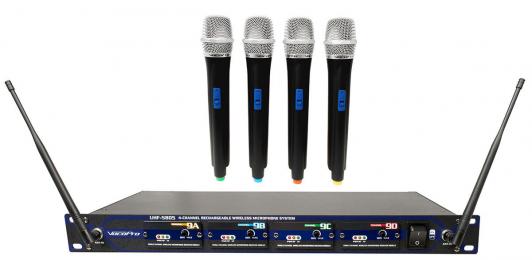
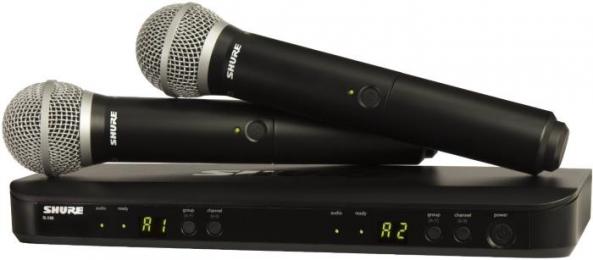

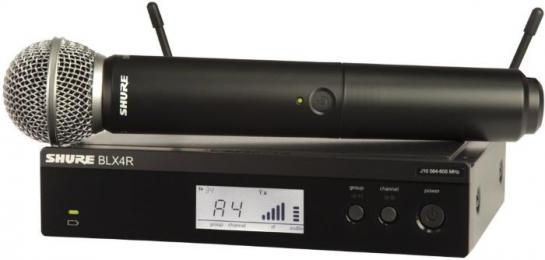
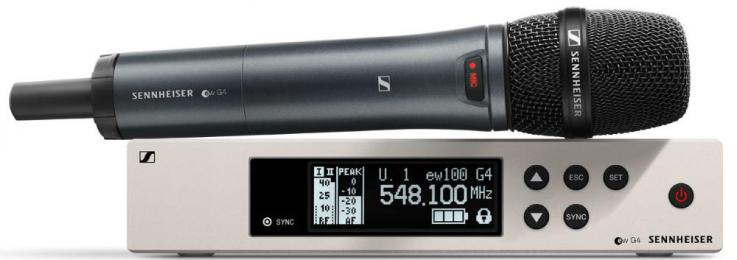
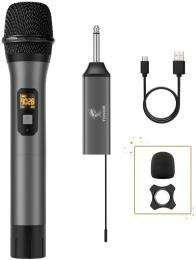
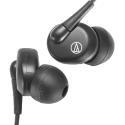
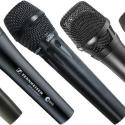
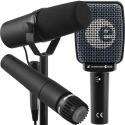

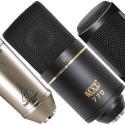
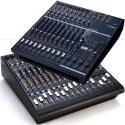
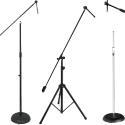
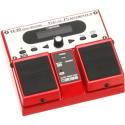
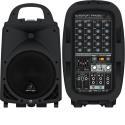
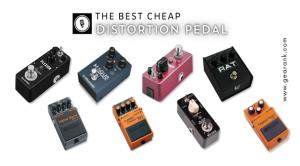
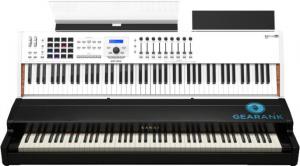
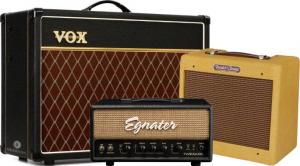
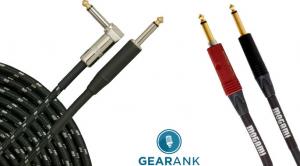
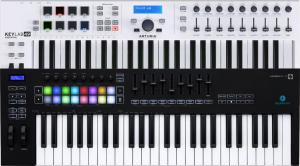
Comments
The following systems came
Submitted by Jason Horton on
The following systems came off the recommended list when we published the November 2022 Edition:
Publication of our November
Submitted by Jason Horton on
Publication of our November 2021 Edition resulted in the following systems coming off the recommended list above:
Our November 2020 update
Submitted by Jason Horton on
Our November 2020 update resulted in the following wireless systems coming off the recommended list above, but you can still see our analysis of them:
Do you know of a Wireless Mic
Submitted by Rolly Lopez (not verified) on
Do you know of a Wireless Mic system, UHF, that can accommodate a wired mic?
Do you mean something like
Submitted by Jason Horton on
Do you mean something like the Xvive U3 but in the MHz range instead of GHz?
Could you please compare the
Submitted by Sanjiv (not verified) on
Could you please compare the Samson 288 wireless mic and the GTD wireless microphone system 733.
I've published our rating for
Submitted by Jason Horton on
I've published our rating for the Samson Concert 288 Handheld so you can compare ratings with the GTD Audio G-733H by using this link.
I need a 4 lav mic system
Submitted by T (not verified) on
I need a 4 lav mic system that complete legal and compliant. Working on my senior project and I want to record a series of interviews and skits.
As a result of our October
Submitted by Jason Horton on
As a result of our October 2019 update the following systems came off our recommended list above, but you can still see our analysis of them:
Any opinion on Pheynx
Submitted by Randy (not verified) on
Any opinion on Pheynx wireless mic systems?
Pheynx Pro is on our short
Submitted by Jason Horton on
Pheynx Pro is on our short-list to be considered for the next update of this guide and we recently published a rating for one of their systems which you can see here: Phenyx Pro PTU-5000.
I need a VHF wireless mic on
Submitted by Ron L Kocher (not verified) on
I need a VHF wireless mic on 76 - 88mhz with as close to the 50mw power limit as possible. RLKocher52@gmail.com 386 627 9330 Thanks!
The Sennheiser EW 135 G3 was
Submitted by Jason Horton on
The Sennheiser EW 135 G3 was removed from the recommended list above today due to being discontinued - you can still read about it here.
I do public address at
Submitted by Bryan Hazard (not verified) on
I do public address at sporting events in large gyms where I am mobile. I am in field houses that may be up to 100 yards long. What is the best system that has the best and largest receiver length?
As a result of our March 2018
Submitted by Jason Horton on
As a result of our March 2018 update the following systems came off our recommended list:
Today we removed the
Submitted by Jason Horton on
Today we removed the following system from our recommended list because the only remaining version available from the manufacturer is not compliant with the new FCC regulations: GTD Audio 622H.
The updated version, G-622H,
Submitted by Jason Horton on
The updated version, G-622H, is now FCC compliant and has been reincluded in our recommended list as part of our March 2018 update.
hi. i am vietnamese, i am a
Submitted by hien nguyen (not verified) on
Hi. I am Vietnamese, I am a teacher so I would like to find a device that supports my teaching job which can use wifi, USB, MEMORY STICK, AND THE FIRST IMPORTANT IT MUST BE SMALL AND LIGHT, IT MADE IN jAPAN OR AMERICAN
This application is too far
Submitted by Jason Horton on
This application is too far outside the use cases that we know about and research here at Gearank.com. Maybe one of our other readers will have advice for you, but most people using this guide do so for stage related purposes or something rather similar to that.
The new FCC rulings no longer
Submitted by D. Ha (not verified) on
The new FCC rulings no longer allow the use of 600MHz range for wireless microphones. Would you update your recommendations?
The new FCC rules don't come
Submitted by Jason Horton on
The new FCC rules don't come into effect until July 13, 2020 - you can read more about that at fcc.gov/consumers/guides/operation-wireless-microphones.
To answer your question, yes we are working on an update to our recommendations, but I don't have a publication date I can announce yet.
This guide has now been
Submitted by Jason Horton on
This guide has now been updated to reflect the FCC regulations that come into effect in 2020.
Looking to buy an affordable
Submitted by Dave Prasad (not verified) on
Looking to buy an affordable 4 channel wireless microphone system, to be used mainly for singing and preaching. Which one would you recommend?
The one we recommend is the
Submitted by Jason Horton on
The one we recommend is the GTD Audio G-787H but I can see that they're out of stock a the moment.
There is a cheaper one from the same manufacturer, and although it's not on our recommended list, it may suit your needs: GTD Audio G-380H.
The wireless microphone for
Submitted by Hue Nguyen (not verified) on
The wireless microphone for the [PRODUCT NAME REDACTED] is posted on Amazon. Could you please let know what this system's Gearank score is for your list?
Sincerely,
Hue Nguyen
Sorry but I had to edit your
Submitted by Jason Horton on
Sorry but I had to edit your post and remove the product name because we've had problems with advertising spam lately and we don't want to encourage it.
To answer your question, that wireless mic system didn't rate highly enough to make our short list (many of its most favorable reviews are suspicious and possibly fake) so we haven't published a Gearank score for it.
Which is the best Wireless
Submitted by Jerry Ken (not verified) on
Which is the best Wireless microphone you would recommend for a lead vocalist in a live band that plays both in and outdoors?
All of the systems featured
Submitted by Jason Horton on
All of the systems featured above will work just fine for your purposes - if you go for the GTD Audio 622H then you'll have a spare mic should you ever need it.
Looking to do Karoke in a
Submitted by Gary (not verified) on
Looking to do Karoke in a catering space with a dance floor that is about 20x20. Already have Samson live!615 speakers.
Would either of these wireless mics be ok?
Stage v466 - Quad Vocal Wireless System - B Band or Samson Stage 200.
thanks,
Gary
Neither of those two systems
Submitted by Jason Horton on
Neither of those two systems made our short-list when we did the original research for this guide so we haven't kept any data on them. The systems listed above are the ones that we currently recommend.
Looking for a REALLY basic
Submitted by FredT (not verified) on
Looking for a REALLY basic plug & play system. To be used on an athletic field, receiver in a building 100' from mic. Ideally receiver has jacks for external antenna, (Metal building) and a SIMPLE single channel mic. (The last unit always had issues syncing mic and receiver.) Many different high school kids and parents using, so idiot proof simplicity is essential.
I can't suggest anything that
Submitted by Jason Horton on
I can't suggest anything that is completely 'idiot proof' because if the receiver's not protected from passers-by they can turn it off or change settings while it's in use, and if you forget to replace the mic's batteries as needed then you'll also have problems.
With those caveats in mind, I believe you would be best served by the Shure BLX24R/SM58. It's relatively easy to use, rack-mountable and the receiver has BNC connectors for both antennas. Avoid the cheaper non rack-mountable BLX24 receiver because it doesn't have the antenna connector you need.
BTW - Although I could be wrong, I don't think there are any good single channel systems with BNC antenna connectors.
I want to upgrade my current
Submitted by Jake (not verified) on
I want to upgrade my current array of 12 wireless microphones to 24. I have a sound board that supports that many channels. Do I need any other equipment to make sure there is no interference other than making sure my frequencies don't overlap?
I've never run that many
Submitted by Jason Horton on
I've never run that many wireless mics at the same time, but the principal should still be the same - if they're on different frequencies then you shouldn't have a problem.
Hi, I have a Shure Lavalier
Submitted by James (not verified) on
Hi, I have a Shure Lavalier BLX4 receiver and BLX1 body pack. I need a better Wireless handheld for toasts and such, but also more than 1 for karaoke. Is the PG58 double good enough, or should I get the 24SM58 single? If I get the single, can I pair another one later? Can I put any to my lavalier receiver and avoid getting either? Essentially, I'm willing to pay a little more to eventually have the fewest receivers and best mic's (in this range) over time. Does that all make sense? Please advise.
The PG58 receiver will be
Submitted by Jason Horton on
The PG58 receiver will be fine for handling both singing and speeches.
If you go with a single receiver then you can add an extra one later but that will cost more in the long run, my preference would be to go the other way.
Do you have a "Best Wireless
Submitted by Phillip (not verified) on
Do you have a "Best Wireless Microphone System Guide - Body Pack"?
We haven't done a guide on
Submitted by Jason Horton on
We haven't done a guide on wireless headset systems with bodypack transmitters yet, but it is on the list of topics we're considering.
Hi!
Submitted by Dan (not verified) on
Hi!
My question is similar to Karen's. I run a Drama Club and I have approximately $556 to spend on wireless microphones. My District recommends Shure and they are great. I already run 4 Audio Technica sets (3 lavolier and 1 handheld) systems... I believe the lavolier are ATW-310s? Don't quote me on that. Anyways, I want to get the best bang for my buck and put as many as I can on stage without feedback destroying my speakers. The most important thing is range and mic sensitivity. We don't sing into it really so that's not that important.
The space is a typical elementary school gym. The stage is built adjacent to the gym but it sucks up sound due to carpeting and a thick curtain and sound absorbing retractable door panels. The speakers are ceiling mounted (I know, not ideal for theater). The system itself is rack-mounted behind a brick wall in a closet approximately...30-50 feet from the stage. I've had no problem with mic drop out as long as the mics are rack mounted. Those plugged into my xlr floor jacks on the other hand...
Thoughts?
Hi, what's the best option of
Submitted by Marcelo (not verified) on
Hi, what's the best option for wireless microphones, headset type, for live singing? Thanks.
We haven't yet analysed those
Submitted by Jason Horton on
We haven't yet analysed those in detail yet but we have processed some for their Gearank scores so this might help: Wireless Headset Microphones
Hi, I would like to buy a
Submitted by Karen (not verified) on
Hi, I would like to buy a system for primary school performances where as many children as possible can wear lavalier microphones and their voices are broadcast to the audience. Any help much appreciated.
We would need more
Submitted by Jason Horton on
We would need more information before we can offer any advice.
What is the main use the system will be for - plays, musical theater, choir?
How many children do you want to mic?
Do you already have a PA System, and if so, how many input channels does it have for microphones?